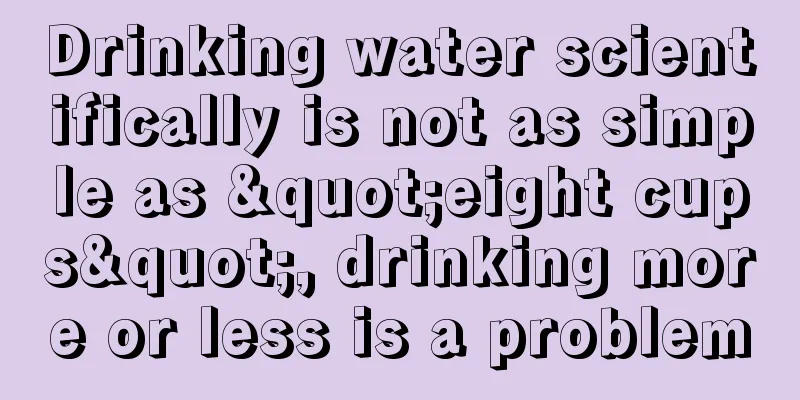Drinking water scientifically is not as simple as "eight cups", drinking more or less is a problem

|
Last Wednesday was World Water Day, the annual call for awareness of protecting water resources. Water is indispensable in our daily life and existence. It is an important component of our body fluids, cells and tissues. It is also the liquid medium for all biochemical reactions and substance transport in the body. It has the functions of regulating body temperature and lubrication. We need to replenish water every day, but do you know the scientific method of replenishing water? Water, too much or too little is not good Thirst is the most obvious sign of dehydration in the body. If you feel thirsty, you are already dehydrated. In addition, dehydration can also be judged from urine. Less urine and yellow urine are another signal of self-judgment of dehydration. As the body's dehydration increases, the less urine there is and the yellow color of the urine gradually deepens. When water shortage reaches a certain amount, it is called water loss. Losing 10% of water can make people irritable, weak all over, cause increased body temperature, lower blood pressure, and loss of skin elasticity. Losing more than 20% of body weight can cause death. For our body, too little water is not good, but too much water can also be dangerous. However, for normal people, the kidneys have normal excretion capacity and water poisoning rarely occurs. However, for some medical conditions, such as kidney disease, liver disease, congestive heart failure, etc., you should not consume too much water, otherwise it may cause excessive water in the body or cause water poisoning. You should follow the doctor's advice to consume an appropriate amount of water. Replenishing water should also be analyzed on a case-by-case basis We often hear people say “drink eight glasses of water every day”, does everyone do this? In fact, drinking water is like many other things. It varies from person to person, and the most scientific amount of water to drink is the one that suits you. People who engage in normal physical activities in a general environment: The body's water requirement is affected by many factors such as age, physical activity, and ambient temperature, so it varies greatly. In general, it is recommended that adults with light physical activity living in mild climates drink 1500 ml to 1700 ml (about 7 to 8 cups) of water per day. People working or exercising in a hot environment: People working or exercising in a hot environment have a higher level of physical activity and sweat more. Depending on the individual's physical workload and heat stress status, their daily water requirements need to be increased appropriately. People with high activity levels in normal ambient temperatures: Under normal ambient temperatures, people with high physical activity levels, such as athletes, farmers, soldiers, miners, construction workers, firefighters, etc., have a lot of physical activities in their daily work, which will increase water loss through sweating. They should pay attention to additional water supplementation and consider supplementing with light salt water. Drink water, pay attention to the scientific method Small amounts and multiple times: about 200 mL (1 cup) each time. When the water level in the body reaches a balance, it can ensure adequate secretion of digestive juices during meals, increase appetite and aid digestion. Drinking a large amount of water at one time will increase the burden on the gastrointestinal tract and dilute the gastric juice, which will not only reduce the bactericidal effect of gastric acid but also hinder the digestion of food. Replenish water in time: Drink water at any time of the day, and never drink water only when you feel thirsty. You can drink a glass of water on an empty stomach after getting up in the morning. Drinking a glass of water can reduce blood viscosity and increase circulating blood volume. You can also drink a glass of water before going to bed, which helps prevent the increase of blood viscosity at night. During exercise, the body loses water faster, and if it is not replenished in time, it will cause water deficiency. When exercising at a high intensity, you should pay attention to replenishing water and minerals during exercise. After exercise, you should drink enough water in time as needed. Choose boiled water: cheap, safe and hygienic are the biggest advantages of boiled water. Compared with sweet drinks, boiled water can also avoid the risk of obesity caused by energy, as well as the risks of tooth decay, diabetes and other risks caused by excessive sugar. |
<<: The symptoms of amblyopia are the most obvious.
>>: Several methods to extend the shelf life of fruits, most useful for housewives
Recommend
Basic symptoms of cervical cancer that female friends should know
The cervix is a place where cancer is more like...
Can kumquat seeds be eaten?
Kumquat is a very popular fruit. It is small in s...
Granulation tissue hemangioma
Tumor is a common disease in people's body st...
Is it harmful to human body if ingested fluorescent powder?
Do you know what fluorescent powder is? Although ...
Bamboo fiber underwear
Underwear is something we wear often. There are m...
How can patients with bile duct cancer prolong their lives?
How can patients with bile duct cancer prolong th...
Is hot compress useful for uterine cold
It is difficult to achieve the treatment effect o...
What disease is it that causes involuntary shaking of head
Shaking your head is a very simple action that is...
Teach you 3 ways to resolve hair static electricity
Static electricity is the most annoying thing, es...
Does papaya really work for breast enhancement?
The claim that papaya can enlarge breasts has bee...
What are the benefits of egg massage on the face
Everyone knows that eggs have a very high nutriti...
Introducing the main symptoms of testicular cancer
I believe everyone has deeply felt the harm that ...
What harm does donating bone marrow do to people
Many diseases in the human body are caused by bon...
Cervical lymph node puncture biopsy
There are lymph nodes all over our body, and they...
Final life expectancy of thyroid cancer patients after treatment
Many thyroid cancer patients still feel anxious e...









